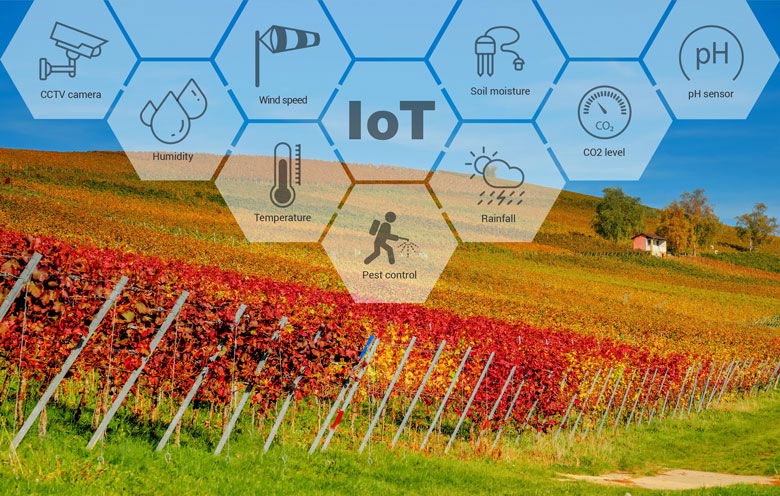The advent of IoT technology has created a big buzz in the last few years. Almost every industry has either adopted it or is in the process of adopting IoT. In the agricultural industry, especially winegrowers, are quite keen to adopt IoT and leverage the benefit of implementing it in the vineyard.
The most important factors for the right growth of grapes are temperature and hydrological stress. And the factors like heavy rains, high temperatures and prolonged drought periods are the most harmful atmospheric phenomenon.
However, with the use of the IoT technology in vineyards, winegrowers can collect environmental data like temperature, humidity, rainfall, wind speed, soil moisture level, etc. that help in protecting grapes from the harmful atmospheric conditions mentioned above.
The collected data is mainly used for the following purposes:
- Improving the quality of grapes
- Increasing the quantity of grapes
- Minimizing the risk and waste
A vineyard management system helps in remote monitoring of vineyards by combining hardware and software platforms. Wireless sensors deployed in the vineyard collect micro-climatic data, soil data and physical conditions of plants.
The collected data is presented on a dashboard in the form of interactive visualizations to derive valuable insights that winegrowers can use to make important decisions to improve vineyard operations.
Let’s check out some more benefits of using IoT in vineyards:
Predictions about vineyard conditions
Remote monitoring helps you to control several factors like vine health status, water status, irrigation requirements, etc. in a vineyard from anywhere. It helps you to detect the ideal time for harvesting and vine pruning, which significantly improves quality and minimizes risks for grapes. IoT also predicts weather conditions to help you prevent your vineyard from heavy loss or damage.
Pest and disease prevention
Many grapevine diseases damage grapes, resulting in heavy losses for the growers. Hence, they have to spread pesticides in the yard to prevent such damages. And it is very important to apply it at the right time else there are chances of more damage, which incurs a huge cost. By combining the sensor data with analytics, you can conserve resources and treat pests and diseases in vines very precisely in the required areas.
Remote irrigation management
Data from soil measures moisture, humidity and pH level to improve crop growth as well as yield. On the other hand, an automatic-irrigation system helps in deciding whether the irrigation system must be kept on or turned off. Hence, this solution helps in better water management, crop productivity and cost-effectiveness.
As per Irstea, use of fungicides against diseases at the right time will help to reduce its use from 15% up to 30%.
Improved process and resource productivity
The integration of IoT devices in vineyards helps you to keep track of activities taking place in the vineyard efficiently. You can get real-time access to the data collected by IoT sensors anytime, anywhere through the web application to monitor and manage the vineyard.
With the help of an IoT solution, you can easily:
- Manage your work activities
- Supervise workers
- Prepare compliance reports
- Know costs
Reduced costs
IoT helps you to lower the cost of production by 20-30% by using less resources such as fertilizers and pesticides while enabling you to manage work efficiently. IoT also helps in minimizing the use of pesticides which minimizes the use of water and manpower in the process. You can save around 50% of water by incorporating IoT in the vineyard.
Environmental sustenance
Minimizing the use of natural resources like water and lowering the use of pesticides helps in the maintenance of a more sustainable environment. The capability to predict how and when to use resources allows you to minimize the impact on the environment.
Conclusion
A smart farming solution enables automation of vineyard operations, water management and cost-effectiveness helping winegrowers to increase efficiency and productivity without incurring any extra cost. IoT also helps you to decrease costs by optimizing the utilization of water, fertilizers and pesticides. To know more about how IoT can help you manage your vineyard efficiently, talk to our experts.

